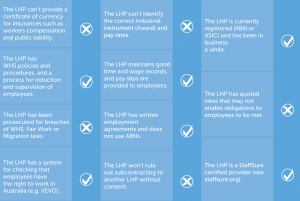Labour hire: The risks, and how to manage them
Using a labour hire provider (LHP) does not mean that labour laws don’t apply to your business – far from it. If the LHP you use does the wrong thing by its workers, then your business could be liable. The main areas of risk relate to workplace health and safety (WHS), employee wages and conditions, and Right to Work and you should have a system to manage that risk. Fair Farms Program Compliance Officer Adam Carter reports.
Step 1: Due diligence
Your business should apply a process of due diligence before engaging a LHP.
Queensland, Victoria, and South Australia have laws that now require the licensing of LHPs. It’s unlawful to use an unlicensed LHP in those states.
To verify that a LHP is licensed, check the relevant online register:
- Queensland: oir.qld.gov.au/licence-register/
- Victoria: labourhireauthority.vic.gov.au/LhSearch/
- South Australia: cbs.sa.gov.au/OccLicPubReg/index.php
Labour Hire Provider or contractor?
The business you are considering engaging may claim that they do not need to be licensed because they are a contractor and not a LHP. It is unlawful to enter into an arrangement that is designed to avoid licensing obligations. Whether or not a business meets the definition of an LHP under state laws depends on a range of factors.
Making sure a LHP has a current license is just the first step.
Below is a checklist of red flags and good practices to consider when preparing to engage with a LHP.
Step 2: Get it in writing
The cost of labour is likely to be one of the most significant expenses for your business. With so much at stake, it’s good business practice to have a written and legally enforceable agreement.
If your LHP does do the wrong thing by their employees – and regulators are asking you some hard questions – a written agreement will help in establishing that your business should not bear any liability. A good agreement will require the LHP to provide your business with evidence that it is meeting its legal obligations and should ensure that there is no sub-contracting without consent.
Step 3: Ongoing monitoring
Effectively managing the risk to your business involves implementing a system to regularly check that the LHP is doing the right thing. Check time and wages records on a regular basis and spend some time talking to the employees of the LHP working on your farm. Make sure you investigate any complaints or issues that arise. Applying this process may take a little time and effort but it could prevent a lot of expense and heartache.
Further resources
To view free training videos, please visit growcom.com.au/projects/managing-labour-hire-risks.
Find out more
Please visit the Fair Farms website. Visit fairwork.gov.au and growcom.com.au for more information regarding your obligations as an employer.
Fair Farms is developed and delivered by Growcom with support from the Federal Department of Agriculture, Water and the Environment and AUSVEG.


